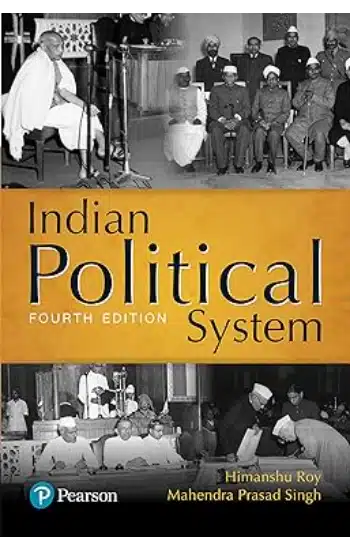
Save: 10%

Save: 25%
Indian Political System
Publisher:
| Author:
| Language:
| Format:
₹705 ₹529
Save: 25%
In stock
Ships within:
In stock
ISBN:
Page Extent:
Indian Political System 4/e, dabbles with the post-colonial political system in India which is premised on two major reconciliations between democracy and capitalism, on one hand and parliamentarianism and federalism, on the other. These are the results of complexities and diversities of India’s culture and social structure as also the ideological consensus forged during the nationalist movement and after independence. In the past seventy years, both capitalism and democracy have expanded and deepened in the inner-most regions ringing in modernities among the citizens. The social movements, the electoral process, the market, the institutions and the governmentality have been instrumental in such development. It has resulted into change in social structure, party system, federal relations and in government policies towards education, health, agriculture, industries, etc. In a nutshell, the book deals with the social-institutional structure, political process, governmental policies and emerging social-political trends. Features• The book has been divided into four sections namely, Colonial Backdrop; Structure; Process and Policy. Each section is enhanced by individual essays detailing the history and its gradual process to being a fast-paced economic country.• This book contains an analysis of the different political structures and processes over a span of centuries, which has helped shape India into the country that it is today.• It provides the reader a comprehensive outline of the political structures and the people who shaped the policies with their intellect to help govern the country.• Lastly, it also talks about the future scope and hope for this enigmatic country.Table of Contents1. The Colonial State2. Colonial Economy3. Constituent Assembly and its Vision of the Future4. Constitutional Amendment and Socio-Political Implications5. The Nature of the State6. Fundamental Rights and Directive Principles of State Policy7. The Parliament 8. Federalism: Constitution and Dynamics9. Federalism: Elite and Nationalities10. The Judiciary: Supreme Court11. The Union Executive12. Governor: Powers and Position13. Bureaucracy and Development14. Ombudsman in India15. Electoral Commission and Electoral Process16. The National Party System17. State Party Systems18. State Politics in India19. Panchayati Raj20. Peasantry and Peasant Movements21. Trade Union Movements22. Women’s Movement in India: Issues and Perspective23. Communalism24. Secularism: The Search for a Theory25. Regionalism26. Social Structure and Democratic Process: Perspectives, Problems and Trends27. Agrarian Policies and Their Impact28. Industrial Policy29. Political Economy of Employment Planning30. Science and Technology Policy31. Terrorism, Public Order and Human Rights32. Environment: A Matter of Survival33. Emerging Trends in India’s Foreign Policy: Challenges and Prospects by34. Reservation Policy in India35. Education in India36. Policy and Planning for Health Services37. India Since 194738. Micro-Movements and Future of Politics
Indian Political System 4/e, dabbles with the post-colonial political system in India which is premised on two major reconciliations between democracy and capitalism, on one hand and parliamentarianism and federalism, on the other. These are the results of complexities and diversities of India’s culture and social structure as also the ideological consensus forged during the nationalist movement and after independence. In the past seventy years, both capitalism and democracy have expanded and deepened in the inner-most regions ringing in modernities among the citizens. The social movements, the electoral process, the market, the institutions and the governmentality have been instrumental in such development. It has resulted into change in social structure, party system, federal relations and in government policies towards education, health, agriculture, industries, etc. In a nutshell, the book deals with the social-institutional structure, political process, governmental policies and emerging social-political trends. Features• The book has been divided into four sections namely, Colonial Backdrop; Structure; Process and Policy. Each section is enhanced by individual essays detailing the history and its gradual process to being a fast-paced economic country.• This book contains an analysis of the different political structures and processes over a span of centuries, which has helped shape India into the country that it is today.• It provides the reader a comprehensive outline of the political structures and the people who shaped the policies with their intellect to help govern the country.• Lastly, it also talks about the future scope and hope for this enigmatic country.Table of Contents1. The Colonial State2. Colonial Economy3. Constituent Assembly and its Vision of the Future4. Constitutional Amendment and Socio-Political Implications5. The Nature of the State6. Fundamental Rights and Directive Principles of State Policy7. The Parliament 8. Federalism: Constitution and Dynamics9. Federalism: Elite and Nationalities10. The Judiciary: Supreme Court11. The Union Executive12. Governor: Powers and Position13. Bureaucracy and Development14. Ombudsman in India15. Electoral Commission and Electoral Process16. The National Party System17. State Party Systems18. State Politics in India19. Panchayati Raj20. Peasantry and Peasant Movements21. Trade Union Movements22. Women’s Movement in India: Issues and Perspective23. Communalism24. Secularism: The Search for a Theory25. Regionalism26. Social Structure and Democratic Process: Perspectives, Problems and Trends27. Agrarian Policies and Their Impact28. Industrial Policy29. Political Economy of Employment Planning30. Science and Technology Policy31. Terrorism, Public Order and Human Rights32. Environment: A Matter of Survival33. Emerging Trends in India’s Foreign Policy: Challenges and Prospects by34. Reservation Policy in India35. Education in India36. Policy and Planning for Health Services37. India Since 194738. Micro-Movements and Future of Politics
About Author
Reviews
Clear filtersThere are no reviews yet.
YOU MAY ALSO LIKE…
CONSTITUTIONAL GOVERNMENT AND DEMOCRACY IN INDIA
Save: 25%
Indian Political Thought | Second Edition | By Pearson
Save: 25%
Mujhe Banna Hai UPSC Topper/ ???? ???? ?? UPSC ????
Save: 25%
Oxford Student Atlas for India, 5th Edition-2024
Save: 25%
UPSC Prelims 13 varsh SP 1 & 2 - 4th Edn-550
Save: 35%



Reviews
Clear filtersThere are no reviews yet.